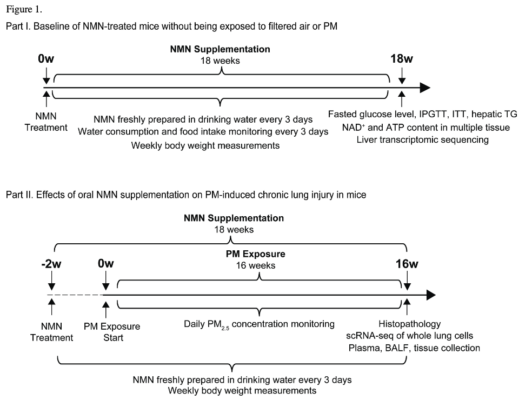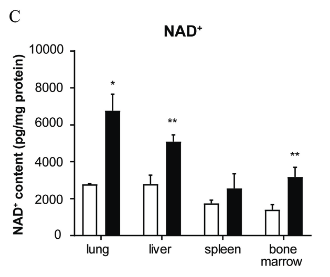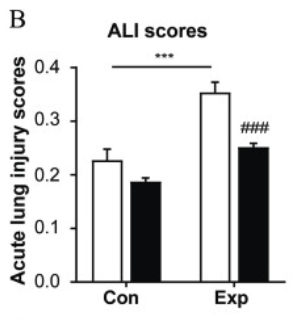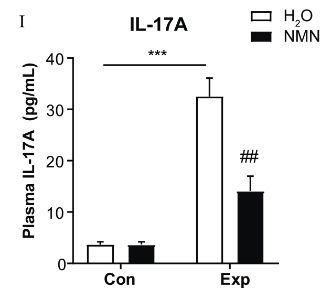This study investigated the protective effects of NMN supplementation in mice exposed to ambient particulate matter (PM).
“As a nutritional intervention, NMN supplementation has been shown to potentially attenuate the diverse detrimental health effects related to aging and xenobiotics-induced injury in mice.”
Ambient PM refers to tiny particles suspended in the air, originating from sources like vehicle emissions and industrial activities. These particles can enter the body, impacting respiratory and cardiovascular health.
Key Points:
NMN showed several benefits in mice exposed to ambient particulate matter:
- Prevented NAD+ depletion in plasma and tissues
- Lowered extent of lung injury
- Reduced inflammation and oxidative stress
- Reduced level of scarring in the lungs
The Effects of NMN Supplementation in Mice Exposed to Ambient Particulate Matter were Evaluated in Mice
One hundred 6-week-old male mice were divided into control (H2O) and NMN-treated (NMN) groups (n=50 per group).
Baseline metabolic profiles were assessed using 10 mice from each group for 18 weeks.
The remaining 80 mice were divided into four groups (n=20 each) for a 16-week study:
- Air-filtered control group
- PM exposure group
- Air-filtered control with NMN group
- PM exposure with NMN group
Oral β-NMN supplementation (500 mg/kg) was given via drinking water and began 2 weeks prior to PM exposure.
“Both epidemiological and experimental evidence has revealed that long-term PM2.5 exposure is positively associated with the increased incidence and mortality of multiple diseases, even at a low exposure level.”

Pictured above: Experimental Design. Part one of the experiment examined the effects of NMN administration in water for 18 weeks on metabolism in mice. The second part investigated the impact of NMN supplementation on lung injury induced by PM exposure.
“We hypothesized that oral NMN supplementation might exert potentially protective effects on PM-induced lung injury by improving immune function and metabolic homeostasis.”
PM-Associated NAD+ Depletion was Prevented
Exposure to PM significantly reduced NAD+ levels by 39.86% (lung), 37.28% (liver), and 41.20% (spleen).
“In the course of PM-induced lung injury, we found that PM exposure led to a depletion of nicotinamide adenine dinucleotide (NAD+).”
However, PM-exposed mice supplemented with NMN had significantly higher levels of NAD+ after PM exposure compared to PM-exposed mice given standard water.

PM-exposed mice supplemented with NMN (represented by white bars) exhibited notably elevated levels of NAD+ in the lung, liver, and bone marrow, compared to PM-exposed mice given standard water (represented by black bars).
Plasma levels of NAD+ were also significantly higher in PM-exposed mice supplemented with NMN.
“Both in humans and in rodents, higher cellular NAD+ content upon NMN administration has been shown to afford enhanced resistance and to stabilize systemic and cellular metabolism in response to stress.”
Extent of Lung Injury was Reduced
The acute lung injury (ALI) scoring system was employed by the researchers to assess the severity of lung injury in the mice.

In the figure, white bars depict mice given standard water, while black bars depict mice supplemented with NMN.
PM-exposed mice supplemented with NMN exhibited lower ALI scores compared to PM-exposed mice given standard water.
Levels of Inflammation and Oxidative Stress were Lower
Cytokine levels were measured to evaluate the impact of NMN supplementation on inflammation.
In the plasma of PM-exposed mice given standard water, TNF-α, IL-1β, and IL-17A levels were 2.86-, 1.29-, and 8.88-fold higher compared to those exposed to filtered air.
However, NMN supplementation effectively reduced the PM-induced elevation in these inflammatory cytokines.

The black bar on the right represents data for PM-exposed mice that were supplemented with NMN, while the white bar represents data for mice that were exposed to PM and given standard water. Notice PM-exposed mice supplemented with NMN exhibited significantly lower IL-17A levels compared to PM-exposed mice given regular water.
“In this study, we established, to our knowledge for the first time, that NMN effectively improved immune functions and lipid metabolism to mitigate markers of lung injury following ambient PM exposure in a mouse model.”
NMN also protected mice from oxidative stress caused by PM exposure.
“Along with the milder inflammatory responses compared with the Exp-H2O group, pulmonary malondialdehyde (MDA) content and plasma MDA concentration (indicative of lung and systemic oxidative stress) were lower in the NMN-treated mice upon PM exposure.”
Lung Scarring was Reduced
NMN protected the mice against PM-associated pulmonary fibrosis.
PM-exposed mice supplemented with NMN showed significantly reduced levels of collagen and hydroxyproline, which are markers of tissue damage that were elevated in PM-exposed mice given regular water.
Conclusion
Oral administration of NMN (500 mg/kg) effectively preserved NAD+ tissue and plasma levels during PM exposure and protected against pulmonary fibrosis in mice.
“In this study, with higher NAD+ content in multiple tissues, 18-wk NMN supplementation led to anti-inflammatory and anti-fibrotic effects on PM-exposed mouse lungs by reducing oxidative stress, chronic inflammation, and excessive collagen deposition.”
